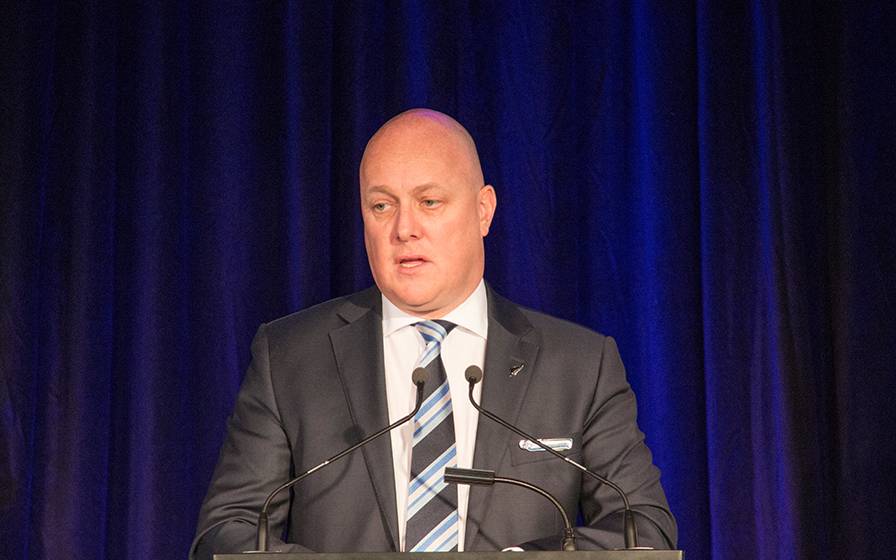Productivity, charter schools, roads, fast-track bill, gangs
No abatement in the criticism of the coalition Government’s Fast-Track Approvals Bill.
Beehive Banter
No abatement in the criticism of the coalition Government’s Fast-Track Approvals Bill.
Beehive Banter
Prime Minister Christopher Luxon is adamant this month’s Budget will be a step on the way to improving the country’s anaemic productivity.
In a pre-Budget speech to the Auckland Business Chamber, Luxon said the coalition Government’s first budget would hold no surprises and would have “no bells and no whistles, just the basics done brilliantly”.
He said it would change the relationship between the Government and business from a “parent-child” to an “adult-adult” one in working towards improving productivity.
“We need to get rid of red tape, which will also help create competition as well as attract foreign investment,” Luxon said.
But NBR reported this week government ministers had ignored advice that removing the depreciation deductions for commercial building owners would negatively affect productivity and put off foreign investors.
In papers posted on Inland Revenue’s website, IRD urged the Government not to remove the depreciation deductions for commercial and industrial buildings, saying it would distort investment decision into lower-quality investments.
“These impacts are likely to dampen productivity growth,” a paper dated December 6 said.
It compared New Zealand’s regime with other countries in the OECD, and said this country had the highest hurdle rate for investing in commercial and industrial buildings of all 38 members of the OECD. Removing depreciation deductions would make it worse and New Zealand would be a less attractive place for foreign investment.
Despite those warnings, though, the Government has proceeded with its plan to dump depreciation deductions, which should save it about $2.3 billion over four years, while bringing back interest deductibility for landlords is forecast to cost $2.9b over the same period.

Prime Minister Christopher Luxon.
Associate Education Minister David Seymour announced this week the Budget would allocate $153 million over four years to set up charter schools, which will be free of some of the regulation State schools face.
When NBR asked just what autonomy charter schools would have, Seymour replied: “Charter schools have the flexibility to develop and implement their own curriculum, provided they make the curriculum available to parents, and tuition standards are no lower than in State schools. Requirements like the cell phone ban and mandatory hour for reading, writing, and maths apply to state schools but charter schools are incentivised to follow best practice because of their contracts.
“Charter schools are contracted to achieving better educational outcomes. If they don’t succeed, then they can be shut down. State schools don’t have the same level of accountability. It is this accountability that means charter schools can have the flexibility to adapt to their students.”
At the same time, the Government is also setting up a new government agency to manage the establishment and operation of charter schools, as well as monitor their performance. That shuts out the Ministry of Education and the Education Review Office from any direct involvement.
It might also mean it will be difficult to truly compare charter school performance with those of State schools because they will be monitored by different organisations, which presumably will use different methods of assessing success.
The first charter school is set to be running from term one next year and the Government expects up to 35 state schools will switch to the new model.
Seymour says charter schools will largely be funded on a ‘per student’ basis and funding will be broadly equivalent to that for State schools with similar rolls and characteristics.
Previously, when charter schools were established under the former National-Act Government, they received much more funding per student than state schools.

Associate Education Minister and Act leader David Seymour.
In another move, Transport Minister Simeon Brown announced the former Labour Government’s New Zealand Upgrade Programme had been dumped and the remaining $6.5b from that programme would be spent on 10 roads of regional significance and two roads of national significance instead.
As part of the change, Brown and Finance Minister Nicola Willis have agreed to delegate all decision making around the scope and delivery of the projects to the New Zealand Transport Agency. Ministers would no longer – as they had for the NZ Upgrade Programme – determine project scope or specific funding decisions.
Removing ministers from the direct decision-making role comes as the Government continues to face criticism that it is giving far too much power to ministers under the Fast-Track Approvals Bill. Under that legislation, which is going through the select committee process now, Brown, Infrastructure Minister Chris Bishop, and Regional Development Minister Shane Jones would decide which projects get approved and which don’t under the fast-track process.
Parliament’s Environment Select Committee has been inundated with submissions, almost all opposed to ministers being given that power, and has prompted further outrage by only offering the opportunity to make oral submissions to about half of the more than 2000 submitters who wanted to turn up in person – or on zoom – to speak to their submissions.
Even former Labour Government Environment Minister Marian Hobbs complained she was snubbed by the committee.

Transport Minister Simeon Brown.
Meanwhile, Newsroom has reported that Jones dined with Stevenson Group’s deputy chair Barry Bragg on the West Coast in February but failed to declare the meeting. Following that meeting, Bragg wrote to Bishop – as suggested by Jones – asking him to consider the Te Kuha coal project on the West Coast to be listed in the fast-track legislation.
RNZ reported that Forest & Bird general counsel Peter Anderson said the incident showed why ministers should not have the final sign-off on projects.
In a written submission on the legislation, Auditor-General John Ryan has raised concerns about perceptions of conflicts of interest and that has been reiterated by a number of submitters, including the Law Society and the Planning Institute.
The Legislation Design and Advisory Committee, which is directed by the Cabinet to review bills against legislative guidelines, also believes it creates problems for ministers who might be lobbied to make decisions different to the recommendations made by expert panels.

Regional Development and Resources Minister Shane Jones.
This week, the police also announced they were setting up a National Gang Unit and district Gang Disruption Units to help deliver on the Government’s pledge to crack down on crime, particularly on gangs.
The Police Association worries it is not backed up by funding and the Labour Party says it is just a renaming of the National Organised Crime Group, which reported to the Ministerial Oversight Group on Gangs.
But Police Minister Mark Mitchell says the new initiative will ensure the police make maximum use of the new tools the Government is giving them to suppress and contain “the misery that gangs cause”.
“The establishment of a National Gang Unit extends on the work already done by Operation Cobalt and will build operational capability when combatting gangs,” Mitchell says.
Finally, former chief executive of the Department of Prime Minister and Cabinet and former diplomat Sir Maarten Wevers will lead an independent review into the disability support services administered by the Ministry of Disabled People.
The controversy around cuts to funding led to Penny Simmonds being dumped as Disability Issues Minister last month. Her successor Louise Upston announced the review, saying it is expected to advise on the pressure the sector faces, as well as recommending what can be done to ensure those services are sustainable in the long-term.
Brent Edwards is the NBR’s political editor.